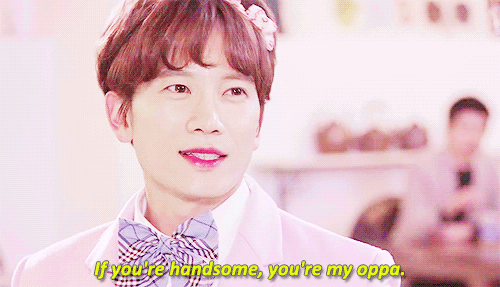 GMMTV 2024 Up & Above (Part 1)
GMMTV 2024 Up & Above (Part 1)
So, you know how sometimes in dramas girls address men who are clearly not their brothers, as "Brother"? The first time I came across this phenomenon was when I watched The Eternal Love, my first ever Asian drama:

This girl has her eyes on the Male Lead and wants to become his second wife. She uses the word „Gege“ five or so times in this short conversation, and it was translated as „Brother“. I wasn't exactly routing for her, but I thought, „Girl, I don‘t know what your strategy is, but if I wanted to marry someone, I would stop calling them Brother ASAP.“ (She actually kept calling him Gege even after they were married, which was even more weird to me.)
This is not done in any European language I know, using Brother as a form of address is reserved for monks mostly.
In Hindi, a language I grew up with, „Brother“ (Bhaiya) is used in a similar form by girls for their actual relatives and close childhood friends, but if you used it outside of that it would mean three things:
You would use it to respectfully address an older stranger, if he was in the age range of a brother.
You were trying to get an older boy to do something for you, pretending to be a helpless little sister. ;-)
Or you were „bro-zoning“ a potential suitor and letting him know you only see him as a, well, brother.

You can see where my confusion came from. So I did a little research about the words that are translated into Brother in subtitles, specifically Gege (Chinese), Oppa (Korean) and P‘/Peê (Thailand).
Disclaimer: I don‘t have a deep knowledge of any of these languages, this is based on Internet research. Sources at the bottom. Please feel free to post corrections in the comments.
So here is what they all have in common:
They can all mean Older Brother and are informal. They are used as a term of endearment by girls for actual older brothers and often also cousins and boys you grew up with.
 |  |  |
But when it is used in the context outside the family, the meanings change up a bit.
Gege Gege is either used alone or behind the first name, so technically you would have to be on a first name basis when thinking in European terms before you would even think of using Gege. (And we all know from dramas, this can take a looooooong time in China or Chinese dramaland at least, where people are (contractually, of course) married and still call each other President Zhao and Teacher Lu.) But say, a girl is well acquainted with this slightly older guy, you can now try and use his first name along with Ge. Jin Ge for example, as a way of staying respectful and not just using the first name, which would be super informal or possibly insulting. Ge is more like the American ‚bro‘. But the Internet tells me, if she would use Jin Gege, it would definitely mean she is taking a step closer in their friendship or indeed trying to start something. Same goes if a guy offers to be called Gege by a girl or calls her Meimei. When two people are already in a relationship, Gege can also be used as an endearing word for „boyfriend“. Gege can also be used among giggling girls to refer to a handsome passers-by or when talking about their crushes. A guy might even suggest being called Gege to take a step closer, like „Brother Jin“ here:
Just before this, Lu Jin tells his crush, the Female Lead, that he does not like to be called Fussy Lu and would like to be called something else. So she offers him Jin Gege instead and he accepts this, even though it is a bit informal. This is shameless on two accounts: one that he is saying he wants to take a step closer and also, being 15 years older, is he even still in the Gege-zone? In another translation, the Gege in this scene was actually translated with „Handsome“, which is probably better, since you can see why using the name „Handsome Jin“ for yourself is indeed shameless and hilarious. In English we also use „Handsome“ as an endearment for men, as in „Hey Handsome ;-)“, which also shows the flirtatious undertones of him wanting to be called Gege by his crush. |
Oppa While Gege can be ambiguously flirty, Oppa is definitely flirtatious these days, unless the man addressed this way is actual family. Oppa used to be just the way to address your older brother or cousins, until very recently, similarly to the Bhaiya I mentioned above. Or as a respectful way to address older strangers. But this apparently changed in the early 2000s when women started calling their High School Crushes Oppa as a way to signal closeness. It then turned into something like the also double-meaning word „Baby“ or „Babe“, a term of endearment among couples.
Only very recently has it turned into something more salacious, with sexual undertones, similarly to the word „Daddy“ in US-American Slang. Similar to Gege, Oppa can also be used to refer to any handsome stranger when girls point him out to their friends.
|
Peê/P‘ This is quite different from the others, because it is just a more informal way to address a more senior person, whether it is an older boy or older girl or even a person much older than oneself. It is generally accepted as a polite form of address and used before that person's name or nickname, because in Thailand nicknames are mostly used in daily interactions, even among colleagues at work.
In subtitles this is often translated as Brother or Sister or not at all, because it is kind of untranslatable. Sometimes the translators leave in the P‘ or they just write down the name. (This also happens with Khun, which is the formal form address, similar to Mr. or Ms.) This makes total sense, because to a Western audience, who are used to the very informal American way of speaking, this would cause confusion about the relationship of the two people talking. And I think here the confusion would be there either way, whether a woman addresses her boyfriend as Brother Benz, Mr. Benz or indeed President Benz. ;-) |
So, what do girls call older boys in your country? Is there anything similar to Gege and Oppa? Or is it more Bhaiya and Peê? Did it confuse you as much as it did me?
Sources:
- https://www.thailanguagehut.com/names-how-to-address-people/
- https://hinative.com/en-US/questions/14914496
- https://hinative.com/de/questions/17850163
- https://www.youtube.com/watch?v=WEbDD3kta_0
- https://www.youtube.com/watch?v=7W43EZDGo30 (Warning for crude language and adult subject.)
- https://68.media.tumblr.com/131a2573561b7c51872345913dd9778b/tumblr_oha2pvfbxI1r19l56o1_500.gif
- All the other GIFs by me.
I want to use this space to thank MDL Writer Cho Na for teaching me how to do better edits.
Edited by: KimWanHee (1st editor)















